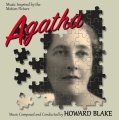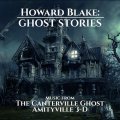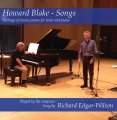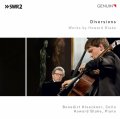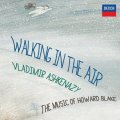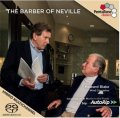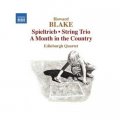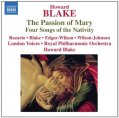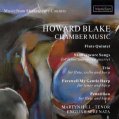 Highbridge Music Ltd.
Highbridge Music Ltd.
Studio 6, 18 Kensington Court Place, London W8 5BJ, UK
Email: howard@howardblake.com
*THE RIDDLE OF THE SANDS op.271 (December 1978)
Score for the feature film of Erskine Childers' novel directed by Tony Maylam (Michael York, Francesca Annis)
Published by: Granada InternationalCommissioned by: Worldmark/The Rank Organization
Instrumentation: Orchestra
[Key to Abbreviations]
Duration: 50 mins
First Performance: rec CTS 18-20 sept 1978
Sheet Music Available
Full score for hireStudy score for hire
Orchestral parts for hire
Recordings Available
Complete score CD AIRSTRIP ONE (for promotion purposes)
Movements
-
1:
The Riddle of the Sands
-
2:
A Walk in the Dunes
-
3:
The Dulcibella
-
4:
Sailing
-
5:
The Inn - Rowing Ashore
-
6:
Barge Building
-
7:
The Kormoran Moves In
-
8:
Into the Fog
-
9:
Carruthers Investigates the Barn
-
10:
The Train to Emden
-
11:
Carruthers Reboards the Train
-
12:
Rehearsal for Invasion
-
13:
Sink the Dulcibella
-
14:
End Titles
Notes
Featuring Michael York, Simon McCorkindale, Francesca Annis, Alan Badel. Directed by Tony Maylam
Concert version of title see op.538
The long opening title sequence of the film lent itself to a song of some sort and Howard suggested a soprano and contralto chorus to sing a part-song with full orchestral accompaniment, rather in the classical period style of the early nineteen-hundreds. This was agreed with director Tony Maylam and Howard asked his friend and German literature expert Christopher Geer if he could write a period-style lyric in German describing the dawn and seascape in the North German islands where the film was shot. He produced 'Das Geheimnis des Sandes' and Howard set and scored it. It was recorded at CTS Studios Wembley on 18th September 1978 by The John Alldis Singers with The National Philharmonic conducted by the composer. However a new and somewhat over-zealous voice-coach unfortunately started a totally irrelevant argument in the studio about pronunciation and this made director Tony Maylam nervous. He requested that another version of the start and and titles be made without singers and this was the version that was finally adopted for the finished film. The vocal version can be heard however on CD AIRSTRIP ONE - the scores of Ridley Scott's THE DUELLISTS and Tony Maylam's THE RIDDLE OF THE SANDS
Performances
| 2nd July 2015 | Howard Blake writes: The first meeting of a club to celebrate the book and film of 'The Riddle of the Sands' (THE RIDDLE OF THE SAND ADVENTURE CLUB) began with a full screening of the feature film of 1978 for which I wrote ths music. I was invited along by Sean Geer who is one of the founder-members, and I made a speech telling how I came to work on the project. Full detalis of the new club and its inception are shown in the link below, Arthur Beale's ship chandlery in Shaftesbury Anvenue and St Giles Church Soho
http://riddleofthesands.net/wordpress/2015/06/23/a-pilot-version-of-the-film-club-arthur-beale-july-2-from-1830/ |
| 21st August 2014 - 21st August 2016 |
Four recently-published books have included biographical/critical articles on Howard Blake,
1. DREAM REPAiRMAN - a biography by Howard's close friend and top film editor Jim Clark which mentions the ill-fated score for the Dustin Hoffman film 'Agatha' on which they worked. Jim Clark, LandMarc Press (UK) 2. BATHED IN LIGHTNING - a book about Sixties music-session men which concentrates on the great guitarist John McLaughlin (Mahavishnu) but mentions a great many others including Howard who worked with John at that time Colin Harper, Outline Press (UK) 3. THE ENCYCYCLOPAEDIA OF FILM COMPOSERS - a tome that tries to detail all of the well-known film composers since the start of cinema including a feature on Howard Blake. Thoms S. Hischak, Rowman and Littlefield (USA) 4. ENCOUNTERS WITH BRITISH COMPOSERS - Well-written articles about contemporary composers drawn directly from live interviews, including a lively one with Howard Andrew Palmer The Boydell Press (UK)
|
| 4th October 2013 | As part of the festival and 75th birthday celebrations, Howard Blake introduces (in German) a programme of projected film excerpts featuring his film scores, Filmkunsttheater Metropol, Dusseldorf 7.30pm Die Filmmusik von Howard Blake Vortrag von und mit Howard Blake in deutscher Sprache mit Filmausschnitten |
Reviews
THE DUELLISTS / THE RIDDLE OF THE SANDS HOWARD BLAKE The Duellists Rating:
The Riddle of the Sands Rating:
Original Review: For many years, much of Howard Blake's film music output has remained unobtainable on CD. Up until recently, only The Snowman has been widely available to collectors, and his score for the classic Raymond Briggs animation remains his most popular work to date. Thanks heavens, therefore, for producers Ford A. Thaxton, Christopher Landry and the people at Super Collector, who have followed up the release of Flash Gordon and Amityville 3D earlier this year with this superb album from the Airstrip One label, combining two of Blake's most highly-regarded, yet hitherto unheard works.
The Duellists was a 1977 film, notable in film history for being the debut feature of a young British director named Ridley Scott, who would later go on to create such classic pieces of cinema as Blade Runner, Alien and Thelma & Louise. Based on Joseph Conrad's classic novel of honour and obsession "The Duel", the film starred Albert Finney, Tom Conti, and Keith Carradine and Harvey Keitel as two soldiers in Napoleon's French army who, following a disagreement, embark on a bitter 20-year rivalry, during which the two engage in a series of violent duels across the battlefields of Europe.
Blake's music for The Duellists is essentially a one-theme work - but what a theme! Presented in its entirety in the opening (but ultimately unused) cue 'The Duellists', the theme is a large-scale, lush, but poignant, as if the music itself knows that the bitter rivalry between Keitel and Carradine can only end in tragedy. It has its roots in the meaningful music of the French renaissance, and effectively carries the emotion inherent in the story, but despite the undisputed beauty of the music, the fact that it is rather repetitive is it's only weakness. To give him his due, Blake does try to vary his styles of performance: as authentic Gallic source music in 'Mme. De Leon's Salon', with hesitant strings in 'Opening Titles', as an expressive piano solo in 'Laura', and so on.
The duels themselves are scored with a series of wildly impressionistic flourishes, notably with rampant, highly dissonant string work in 'Cavalry Duel', resounding percussion in 'Pistols', and icy harp and piano scales in 'The Final Battle in the Woods'. In addition to these, there are a couple of interesting diversions to maintain interest, such as the fife and drum of 'Military Life', the Renaissance-style light-hearted pageantry of 'Armand and Adèle', 'The Château' and 'The Marriage', and the vibrant (but short!) 'Jubilation'. In contrast, by far the most effective cues are the last ones, 'The Lonely Walker' and 'End Credits', in which the music acts as a final epitaph, and sounds almost heartbroken and hollow, a musical echo of the state of mind of the ultimate victor in the series of duels who, having finally vanquished the object of his lifelong obsession, realises he has nothing else to live for.
The Riddle of the Sands, directed by documentarian Tony Maylam, is a desolate spy thriller based on the 1903 novel by Erskine Childers (who would later go on to form the Irish political party Sinn Fein). It stars Simon MacCorkindale as a yachtsman who, while out sailing in the North Sea off England's east coast, accidentally stumbles across what looks to be a German plot to invade the country, using the remote Frisian Islands as a staging post. Featuring Michael York, Alan Badell and Jenny Agutter, The Riddle of the Sands was actually something of a commercial flop, and despite being released in the UK during 1979, didn't make it to American shores until early in 1984.
As with The Duellists, the thing which The Riddle of the Sands has going for it is the strength of its main theme, a powerful, lyrical melody which Blake freely admits was influenced by Wagner's Ring Cycle. In the opening statement the music is accompanied by a choir singing in German, a beautifully poetic song entitled Geheimnis des Sandes, which adds volumes to the mysterious, potent energy provided by Blake's music. Unfortunately, the vocal version of the main title was omitted from the final cut of the film, and is being presented in this form for the first time here. The theme is recapitulated, to great effect, in further tracks such as 'A Walk in the Dunes', where the melody is led by a series of plaintive woodwind solos, 'Rowing Ashore', where it is accompanied by the orchestra eddying in time with the ocean currents, and 'Carruthers Reboards the Train', where it is performed with muted heroic gusto by the brass section.
But, unlike The Duellists, The Riddle of the Sands builds up an interesting series of sub-themes, often playing against and in counterpoint to the main melody. A dark, ominous two-note motif for the German invaders, and the turncoat agent Dollman, is first heard at the end of 'Sailing', and features in later cues such as 'The Inn', 'The Kormoran Moves In' and 'The Train to Emden', while the theme for the Jenny Agutter character is a subtle variation on the "antagonists theme", and is heard performed by mysterioso strings in 'Barge Building', 'Into the Fog' and others. A unique piece in the score, 'Sailing' is a sprightly scherzo for a bed of strings which takes on the carefree, undulating quality of the ocean.
It's quite astounding to realise that, considering the amount of talent he obviously has, Howard Blake's career as a film composer has never developed in the way it should. He has scored only two films in the last eight years - A Midsummer Night's Dream and My Life So Far - and is hardly ever mentioned when lists of great British film composers are compiled. It makes you wonder just what might have happened if the American executives had allowed Blake to score Alien, as Ridley Scott originally intended, instead of Jerry Goldsmith. What ifs and maybes aside, this is still a superb album, and a timely reminder of the talents of Howard Blake. If "Walking in the Air" made a shiver run up your spine without you knowing why, this CD provides the answer.
Track Listing:
THE DUELLISTS The Duellists (3:01) Mme. De Leon's Salon (2:38)Opening Titles (0:59)Military Life (0:23)Laura (1:47)Armand and Adèle (1:32)I Renounce Love (0:59)Tarot (1:31)Cellar Duel (0:58)Cavalry Duel (2:13)Jubilation (0:29)Russian Winter (6:21)The Château (1:11)The Marriage (1:35)The Challenge (0:49)Pistols (1:05)Final Duel in the Woods (3:29)The Lonely Walker (2:44)End Credits (3:17) THE RIDDLE OF THE SANDS The Riddle of the Sands (4:29) A Walk in the Dunes (1:41)The Dulcibella (1:10)Sailing (4:46)The Inn/Rowing Ashore (1:57)Barge Building (3:51)The Kormoran Moves In (1:12)Into the Fog (1:26)Carruthers Investigates the Barn (1:48)The Train to Emden (2:53)Carruthers Reboards the Train (2:22)Rehearsal for Invasion (5:03)Sink the Dulcibella! (1:36)End Titles (2:23) Running Time: 77 minutes 54 seconds
Airstrip One AOD-HB002 (1977/1979/2000)
THE DUELLISTS composed and conducted by Howard Blake. Performed by The National Philharmonic Orchestra. Recorded and mixed by John Richards. THE RIDDLE OF THE SANDS composed and conducted by Howard Blake. Performed by The National Philharmonic Orchestra and The John McCarthy Singers. Choir conducted by David Shaw. "Geheimnis des Sandes" lyrics by Christopher Geer. Recorded and mixed by John Richards. Album edited and remastered by James Nelson. Album produced by Howard Blake, Ford A. Thaxton and Christopher Landry.
Jonathan Broxton, Movie Music UK, 2000

